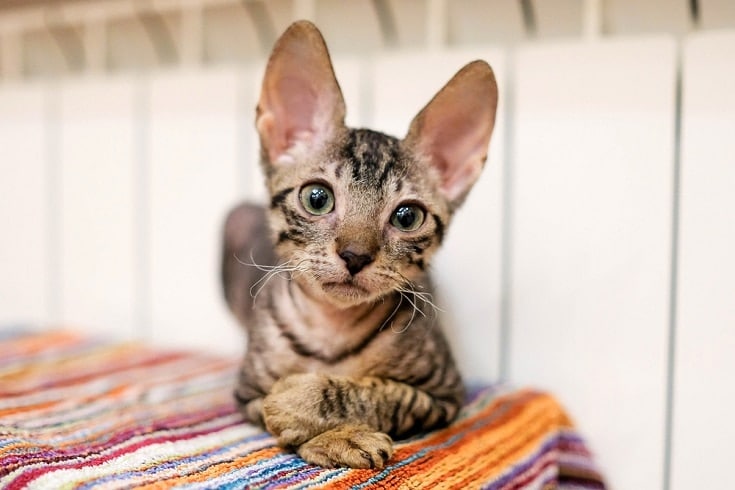[ad_1]
Cornish Rex cats are lovable short-haired kitties known for their playful persona and rippling soft coat that lacks coarse guard hairs. In a certain light, it looks a lot like the texture of a washboard in fur form. This might make you think they’re low-shedding and hypoallergenic, and you’d be half right. Is a Cornish Rex hypoallergenic? Cornish Rexes shed far less than the average cat. They are not, however, hypoallergenic in the sense that you’re safe from pet allergens like fur and dander. Cornish Rexes still shed minimal amounts of fur and dander that can trigger allergies, but less so if you help them groom on a regular basis.
If you’re curious about welcoming a Cornish Rex into your home but want to learn more about them, tips for grooming them, or want to see some other low-shedding cats, we’ve got you covered below.

About the Cornish Rex
Cornish Rex cats are a fairly new breed tracing back to an unusual “Rex” mutation that spontaneously occurred in a litter of kittens in Cornwall, England in 1950. This gene made the breed’s fur extremely soft and devoid of guard hairs altogether. A woman named Nina Ennismore discovered this and just so happened to be familiar with the Rex gene but in rabbits! The Cornish Rex’s signature wavy rabbit-like coat sent shockwaves through the cat world, and their zany, social nature sealed the deal.
As a relative of the Devon Rex, the Cornish Rex is renowned for exhibiting exuberant dog-like behavior, going so far as to gallop like a Greyhound and fetch like a Golden Retriever. This is a cat for active families who can spend lots of quality time together, or else they can become anxious and occasionally destructive. With proper care, though, Cornish Rexes are some of the most fun and interactive cats you can own.

What Other Cats Shed the Least?
The Cornish Rex is one of a select few cat breeds that evolved to have short, low-shedding fur. They’re not hypoallergenic, but allergy-suffering cat lovers will feel more at ease and literally breathe easier with one of these cat breeds at home.
Low-Shedding Cat Breeds:
- Devon Rex: This breed has soft, wavy fur similar to the Cornish Rex, shedding minimally.
- Abyssinian: A breed with short, dense, and glossy fur that sheds remarkably little compared to other cats.
- Bengal: This tiger wannabe breed might not look like it, but they’re consistently one of the most popular low-shedding cats you can own.
- Siberian: The regal Siberian’s coat looks intimidating, but it sheds about the same as a shorter-haired cat.
- Russian Blue: The plush Russian Blue coat isn’t just beautiful and nice to pet; they shed a lot less than the average cat breed.
Do Cornish Rex Cats Require Special Grooming?
No, Cornish Rexes don’t require any special intensive grooming to stay clean, neat, healthy, and presentable. In fact, they’re one of the best breeds you can get if you don’t want to worry about grooming or allergies. Like all kitties, they’re fastidious about self-grooming and keep their coat very nice. Still, there’s some stuff you could be aware of when it comes to making the most of their low-maintenance coat. Jot down these tips for an easier time later.
Cornish Rex Grooming Tips for a Cleaner Kitty:
- For dingy or dull Cornish Rex coats, groom with a soft brush to restore your cat’s natural skin oils throughout their fur, keeping it lusher.
- Cats skeptical of brushes can be simply rubbed down with your hands, which helps redistribute oils through the fur.
- The coat might be low maintenance, but you want to keep an eye on your cat’s nails and trim to an appropriate length every 6 weeks or so.
- To clean dirty or clogged-up ears, never use soap or prod with Q-tips. Instead, simply wipe gently with a clean damp cloth.
- If your cat gets covered in a liquid of some kind like cooking oil or sugary drinks, wipe down their coat with a warm, damp cloth and running water, dipping the cloth in water frequently to wash the gunk off.

Wrapping Up
Cornish Rexes are one of the feline world’s low-shedding genetic miracles, and they all owe it to a random mutation in a British barn! Though you don’t need to do much, running a soft brush over their fur and helping to keep their ears & nails clean will go a long way.
Featured Image Credit: Elena Loginova, Shutterstock
[ad_2]
Source link
